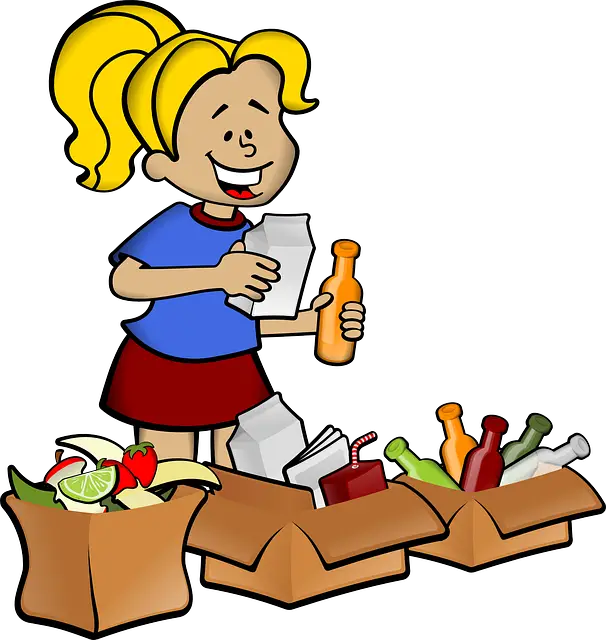In the guide below, we consider how an individual might be able to reduce their waste footprint.
We’ve listed what might be 5 of the most effective and simplest ways to do this, along with providing information on how to potentially manage specific types of waste.
Summary – Ways For Individuals To Reduce Their Waste
5 simple and effective ways for individuals to reduce their waste might include:
1. Reduce food waste
2. Reduce disposable and single use waste (plastic single use material in particular)
3. Reduce individually packed item waste (such as bottles, packets of food, etc.)
4. Reduce plastic waste
5. Quit or reduce smoking, or dispose of butts without them becoming litter or waste pollution
1. Reduce Food Waste
Food waste can be easy to reduce or eliminate. Some steps or tips might be:
– Know how much you (and your family if you have one) eats each week, and plan food shopping accordingly whilst minimizing impulse and unplanned purchasing of excess food
Take into account if you eat out regularly, and how this impacts your food shopping too
– For families – identify the ways in which kids/children might waste food, and try to minimize these ways where possible.
– Fresh food like vegetables and fruits is more likely to spoil when left uncooked or not frozen – so make sure you eat it first, or cook/store it accordingly
– When you eat out at restaurants – always make sure you order only what you’ll eat so there’s no waste.
If you have leftovers, consider asking for a recyclable cardboard container to take it home to eat the next day (as long as it’s safe/hygienic to do so, and the restaurant allows it)
2. Reduce Disposable & Single Use Waste
We are talking about disposable and single use items like coffee cups (that have plastic liners in them), shopping bags, plates and cutlery, food containers and so on.
Start using reusable and washable items where possible
Reusable carrier bags, reusable work food/lunch containers, reusable coffee cups, and reusuable drink bottles are all examples of items that won’t end up as single use waste
3. Reduce Single/Individually Packaged Waste
Single/individually packaged waste includes things like individually packed packets of noodles, individually packed soda cans, individual coffee sachets and so on.
Instead, buy bulk packed foods, drinks and other products, or products with reduced packaging.
For example, buying coffee in a large container instead of individually wrapped sachets may be one way to do this.
4. Reduce Plastic Waste
We are singling out plastic because plastic packaging and plastic disposable items are among the most wasted and littered materials and items there are (compared to other materials).
Reducing plastic waste in the products you buy, or using alternate materials like metal or glass for certain products where possible, are two ways to reduce total plastic waste.
5. Quit Or Reduce Smoking
Cigarette butts are one of the most littered waste items on the planet
They are found everywhere from land, to rivers, to beaches, and even in the ocean.
Quitting smoking is an ideal solution.
But, where quitting is difficult or not the chosen option, reducing smoking, or adequately disposing of butts helps address pollution concerns.
Other Ideas To Reduce Your Waste
– Conduct a trash audit to see what waste makes up the largest % of your overall waste footprint
– Be aware of the types of waste that end up in landfills most commonly, and compare it to the waste that most often ends up in your bin at home
– Be aware of the types of waste that end up on beaches and in oceans the most, and compare it to the waste that produce as an individual. Cigarette butts and plastic items are a few of the common waste items from land sources
What To Do About Yard Trimmings?
Ask yourself if you can put yard trimmings into a compost bin, or use them as organic matter for your soil.
Otherwise, does your city have a compost you can send them to instead of landfill?
What To Do About Plastics?
Single use, highly disposable plastics are the big offender
Plastic bags, food wrappers, straws, food containers, plastic bottles, plastic lids – all contribute heavily to plastic waste
Reusuable carrier bags, buying fresh non wrapped food as much as possible, getting drinks without a straw, using re-usuable/washable food containers, and using re-usuable bottles for drinks that you can wash, might all be options to use less plastic
What To Do About Paper and Paperboard?
A big way to cut down on paper waste is to do as much electronically as you can
For registrations, subscriptions and other services that send paper statements – try to set them all up electronically instead of having post mail
Unsubscribe from junk paper mail too.
Think about where other paper alternatives can be used for other applications.
What To Do About Metals?
Ask yourself if you can be recycling these metals instead?
Metals are usually one of the most valuable recyclable materials
What To Do About Textiles?
Buy higher quality clothes and fashion items that are going to last years, and buy less often
Buy second hand if you can
Recycle fabrics and textiles where possible
Sort & Dispose Of Waste Into The Correct Bins At Home
This is not necessarily a waste reduction tip, but it helps with better management of waste.
Understand what waste goes into what bins at home.
Understand what waste can be recycled in your area, read the recycling symbols on the packaging, and make sure you are putting that waste in the right bin.
Make sure that you able able to separate food waste from recyclable plastic – as contaminated plastic (contaminated with food waste) often can’t be recycled.
Also, place organic waste like food and plant scraps into your compost/organic matter bin if you have one.
Sources
1. https://www.bettermeetsreality.com/most-common-types-of-waste-found-in-landfills/
2. https://www.bettermeetsreality.com/most-commonly-littered-items-in-society-land-rivers-beaches-oceans/
3. https://www.rubiconglobal.com/rubiconmethod/eliminate/#method
','' ); } ?>